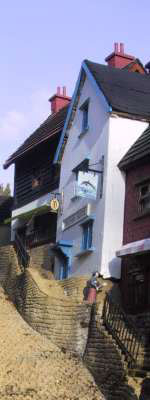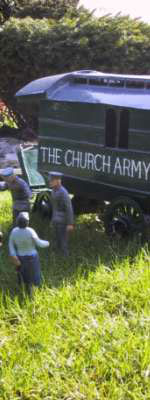|
|
|||||
| HOME ARTICLES GALLERIES ABOUT US FORUM LINKS CONTACT JOYLAND BOOKS | |||||
|
BEKONSCOT: THE TIM DUNN INTERVIEW Interview by Gary Radice Article: Added November 2005 |
|||||
|
The sound of a heavenly choir resonating from a
church on a hill. A game of cricket on the village green. A model railway enthusiast's dream and a
piece of 1930s rural England where time stands perfectly still. Welcome to Bekonscot in Beaconsfield
(UK) -
home to the world's oldest model village. Thanks to Tim Dunn for the interview and use of
the photographs which are copyrighted to Bekonscot Ltd (2004). Storyboard by themagiceye.
|
|||||
|
Tim, is it true that Bekonscot is the oldest model village in the
world?
We think Bekonscot is certainly the oldest surviving, or oldest original, model village in the world… but there is still a lot of research going on into that! The term 'model village' can apply to many sorts of model, but I prefer to narrow it down to a collection of scale model buildings built as a cohesive unit outdoors. Bekonscot was built in the mid-late 1920s – we don’t have a definitive start date as most early records were destroyed in WW2. We do know it opened to the public in 1929, making it the 'Grandfather' of all other model villages and miniature parks. Most model villages in the UK and many abroad owe their existence and inspiration to Bekonscot. Builders of Babbacombe, Ramsgate, Southport, Clonakilty, Corfe Castle, Great Yarmouth, Tucktonia, Legoland and Madurodam all came here to get inspiration. A lot of the original buildings and features are still here – that’s part of its charm and beauty – and why people come back year after year. People connect with it – it’s part of the childhood of every person living in the district. You can’t fake real heritage. It was built by Roland Callingham, a wealthy London accountant. His wife at the time warned him that his model railway had outgrown the house - and either it went outdoors, or he did! He transformed the neighbouring meadow (and his extended rose garden) into an alpine garden complete with 1:12 scale houses and 1:32 scale model railway. He was the driving force behind the village until his death in the 1960s, but was ably assisted by his gardener, chauffeur and housekeeper. A very English concern! The village continued following his death, but was in difficulties. Luckily for us all, The Church Army (to which Roland was linked for many years) stepped in to manage it. The village is now held in Trust and is so saved 'for the nation'.
Where do all the models come from?
All of the buildings are built here at Bekonscot –
we build pretty much everything from scratch. We buy in materials for buildings – be it concrete,
metal, stone or dense foamboard – but that’s turned into the little masterpieces of English buildings that you
see.
The Gauge One model trains are also built on site and have been since the 1950s. The model people, once carved by hand from wood, are now created by one of our talented modelmakers in resin: she creates body parts in moulds and then fits and re-models them together in unique positions. If only people realised quite how much time and artistic
skill goes into creating this miniature world!
How many people work/volunteer at Bekonscot? There are a dozen full-time staff working on maintenance,
engineering, gardens and admin. There are several more on catering and retail –
plus dozens more part-time staff working across departments.
We’re aged 16 to 80-something…and we all adore it. It’s rather like an extended family; helped by the fact that several of us are related anyway! It’s one of those businesses that is truly loved
by those who run it. It’s not just a job – it’s a way of
life.
Tim, do the profits go to charity?
All of our profits go to charity – about £4 million
at current rates since 1929.
Upkeep costs for seven miniature towns, railway network and countryside are huge – but still we manage to donate about £50,000 to charity every year. That gets split between many beneficiaries – local community groups to international hospices. By coming to Bekonscot, visitors don’t just get
a great little day out – they also help support many less fortunate people.
|
|
||||
|
|
|||||
|
THEMAGICEYE | Terms and Conditions | Privacy Policy | Contact Us |
|||||




